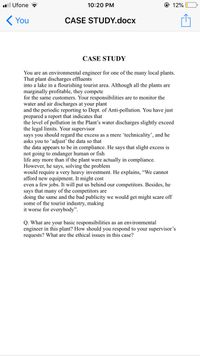
Structural Analysis
6th Edition
ISBN: 9781337630931
Author: KASSIMALI, Aslam.
Publisher: Cengage,
expand_more
expand_more
format_list_bulleted
Concept explainers
Question
Provide a detailed solution.

Transcribed Image Text:ll Ufone
10:20 PM
@ 12%
K You
CASE STUDY.docx
CASE STUDY
You are an environmental engineer for one of the many local plants.
That plant discharges effluents
into a lake in a flourishing tourist area. Although all the plants are
marginally profitable, they compete
for the same customers. Your responsibilities are to monitor the
water and air discharges at your plant
and the periodic reporting to Dept. of Anti-pollution. You have just
prepared a report that indicates that
the level of pollution in the Plant's water discharges slightly exceed
the legal limits. Your supervisor
says you should regard the excess as a mere ʻtechnicality', and he
asks you to ʻadjust’ the data so that
the data appears to be in compliance. He says that slight excess is
not going to endanger human or fish
life any more than if the plant were actually in compliance.
However, he says, solving the problem
would require a very heavy investment. He explains, "We cannot
afford new equipment. It might cost
even a few jobs. It will put us behind our competitors. Besides, he
says that many of the competitors are
doing the same and the bad publicity we would get might scare off
some of the tourist industry, making
it worse for everybody".
Q. What are your basic responsibilities as an environmental
engineer in this plant? How should you respond to your supervisor's
requests? What are the ethical issues in this case?
Expert Solution
This question has been solved!
Explore an expertly crafted, step-by-step solution for a thorough understanding of key concepts.
This is a popular solution
Trending nowThis is a popular solution!
Step by stepSolved in 3 steps

Knowledge Booster
Learn more about
Need a deep-dive on the concept behind this application? Look no further. Learn more about this topic, civil-engineering and related others by exploring similar questions and additional content below.Similar questions
arrow_back_ios
arrow_forward_ios
Recommended textbooks for you

 Structural Analysis (10th Edition)Civil EngineeringISBN:9780134610672Author:Russell C. HibbelerPublisher:PEARSON
Structural Analysis (10th Edition)Civil EngineeringISBN:9780134610672Author:Russell C. HibbelerPublisher:PEARSON Principles of Foundation Engineering (MindTap Cou...Civil EngineeringISBN:9781337705028Author:Braja M. Das, Nagaratnam SivakuganPublisher:Cengage Learning
Principles of Foundation Engineering (MindTap Cou...Civil EngineeringISBN:9781337705028Author:Braja M. Das, Nagaratnam SivakuganPublisher:Cengage Learning Fundamentals of Structural AnalysisCivil EngineeringISBN:9780073398006Author:Kenneth M. Leet Emeritus, Chia-Ming Uang, Joel LanningPublisher:McGraw-Hill Education
Fundamentals of Structural AnalysisCivil EngineeringISBN:9780073398006Author:Kenneth M. Leet Emeritus, Chia-Ming Uang, Joel LanningPublisher:McGraw-Hill Education
 Traffic and Highway EngineeringCivil EngineeringISBN:9781305156241Author:Garber, Nicholas J.Publisher:Cengage Learning
Traffic and Highway EngineeringCivil EngineeringISBN:9781305156241Author:Garber, Nicholas J.Publisher:Cengage Learning


Structural Analysis (10th Edition)
Civil Engineering
ISBN:9780134610672
Author:Russell C. Hibbeler
Publisher:PEARSON

Principles of Foundation Engineering (MindTap Cou...
Civil Engineering
ISBN:9781337705028
Author:Braja M. Das, Nagaratnam Sivakugan
Publisher:Cengage Learning

Fundamentals of Structural Analysis
Civil Engineering
ISBN:9780073398006
Author:Kenneth M. Leet Emeritus, Chia-Ming Uang, Joel Lanning
Publisher:McGraw-Hill Education


Traffic and Highway Engineering
Civil Engineering
ISBN:9781305156241
Author:Garber, Nicholas J.
Publisher:Cengage Learning